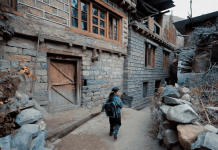He took out three different newspapers out of the big jute sacs. Those were hanging from the hooks kept on both sides at the back-seat of his two-wheeler. He, the newspaper-delivery-man named Karia-bhai, bundled those into a roll and tied with a rubber-band. The start of his badly-faded two-wheeler was on and he kept his one leg on the ground for support. And then before handing over the newspaper-roll to Sultan-bhai, the security-guard on duty, at the B-gate of Binigurhi colony, he enquired, “Sultan-bhai, Is it true that a leopard has been seen near the colony?”
Immediately Sultan-bhai said, “Oh ho, Karia-bhai, don’t you know?” further he continued, stretching his hand towards the dumped limestone-heaps, the bings, which appeared almost like small hillocks, “In the name of holy-mother, Karia-bhai, it isn’t one leopard but leopards, a mother and her two cubs. It’s a very big animal, you know.” Keeping his head out of the small window of the temporary check-post made out of wooden planks and asbestos sheets on top, he said “O, Karia-bhai, See there at the far-end of that hillock, there’s a row of Peepal and Banyan trees. The leopards moved close to that hillock. They probably came from the wilderness near the sea-shore.” He further continued, “The security guard of the port-colony apprised the movements of the big-cats earlier too. Be careful, Karia-bhai.”
At the far end of Western-India, it was in the December of 2015, a small residential colony of a chemical-plant in the peninsular Sorath region, very close to the coast of Arabian Sea. The people residing in the Binigurhi colony, belonged to that chemical-plant, were literally panic-stricken. The reader may wonder but it was really true that the colony, merely nine kilometers away from the nearby city, had had some unexpected guests roaming around in the dark of the nights around the ghostly bings.
Sightings of a leopard along with her two cubs were confirmed by several other people too, such as the priest of the temple at the outskirts, a shopkeeper and a plumber of the port-colony. Albeit, the panicky people, out there at Binigurhi weren’t at all like the characters of the stories of Jim Corbett sahib, however the inherent nature of any human being and his behavioural expressions would remain similar at all places and in all times.
On both sides of the state-highway, there were small and big shops, workers’ slums, and the colony which included hospital, post-office, bank, school etc. in short all that a residential surrounding would definitely boast.
Next day Sajid bhai, another security-guard apprised to the principal of the school, Mr. Suleman, exactly when he was about to come out of his car, “Sahib, a tiger has come near our colony. Be careful; do not move out in the dark.” While closing the door of his car Mr. Suleman said, “Oh no, no, Sajid bhai it’s not a tiger but a leopard. You know. Among all big cats leopards are very shrewd. And they are very shy too. Since leopards prefer to live a solitary life always they remain very vigilant. Though they move closer to the human habitations, they always try to remain hidden.” And he also added that the big cat wouldn’t remain long time out there, after some time it would leave the place and move to some other area.
News of ‘Leopards in Binigurhi’ spread far and near. No sooner the people from the forest-department receive the message one officer and two forest guards rushed to Binigurhi. On behalf of the company very good arrangements were made for them at the VIP guest house. The forest people ordered a big cage and a goat to be kept as ‘bait’, to trap the big-cat within that cage, with the help of their workmen and vehicles. Movements of the vehicles from the forest department increased intensely. Every evening they would examine thoroughly every nook and crannies in and around the Binigurhi colony. One of their vehicles, an open jeep, would move quite stealthily for they were looking for the possible tracks of the leopards.
After two days they thought that they found the coveted track. They earmarked the location and thereafter they kept the cage at a suitable place along with the ‘bait’, that alluring black-goat having shining coat. But the adroit big-cat accompanying her two cubs acted very smart. She simply avoided the trap laid by the forest people. Instead the leopard-mum hunted a stray-pig from a waste-land close to the temple at the outskirts of Binigurhi and surreptitiously moved back to the safe heaven, the isolated forest-tract behind the Binigurhi colony. Beyond that tract of forest plus wastelands there was the coast-line of Arabian-sea.
People of Binigurhi discussed, “what a clever big-cat, it befooled the forestwalas neatly.” Much before the daybreak, I mean the dawn; a security guard named Gangaram had been to that locality on the sly just to have a glimpse of the cage kept by the forest people. From a safe distance he peeped. But alas, all in vain, there wasn’t any sign. The black goat was found bundled at one corner, sleeping and totally oblivious of its own fate.
As usual, words spread in no time. Security guard Gangaram’s trespassing-news reached the head-office of the security division. Mr. Chelladurai, head of that section, called him on that very day, in the afternoon. And in his typical Southern accent Mr. Chelladurai admonished Gangaram, “You don’t need to show your bravery, you see. We know that you can catch snakes, but this is no snakes, you see. It’s leopard, man! The forest people have warned us to remain very careful. Why did you go there? Never disobey your supervisors’ orders. Forest people apprised us of the dos and don’ts. See, man, minimum three security persons should be together while moving during night. Never forget to carry lathis and search-lights, do you understand, for God’s sake? Hereafter, never indulge in such acts of bravery, mind it.”
During those days, soon after the sunset, no child was seen in playgrounds and open-spaces. Within the colony premises people stopped moving in the out. Early morning walkers and the late evening walkers stopped their health-conscious diligent-activity abruptly. There were small-children quite a few in the B-colony for there were all senior employees out there. Their children were all grown up, by then, either married or doing higher studies or jobs elsewhere in India or abroad. Occasionally they would visit their parents.
One evening Mr. Roy, a resident of the B-colony, was waiting in the railway station of Binigurhi to receive his daughter. The train was too late. He already received several calls from his wife back home, to be precise, the quarter in which they lived. Mrs. Roy was there in the quarter all alone. Neither she nor her husband did expect that the train would be so late. All on a sudden she heard consecutive three shrill calls and accompanied by loud bustle, very weird for her. It was spine-chilling experience for her. Immediately she picked up the internal telephone and called the sentries at the main gate of the B-colony. One of the security guards, a Gurkha, received her call. And he assured in his typical accent, “Hallu; Yos maadomji; you don’t worry maadomji; One parson kaaming soon and seeing all round your koartor.”
The security guard named Gangaram came, then and there. Looking every nook and crannies around the quarter he consoled her, “Roy Madam, you don’t worry, the pea-fowls are roosting on the big banyan tree nearby. There is nothing dangerous madam.”
“See, the train is so late today; Roy sahib has gone to pick up our daughter, she is coming from Mumbai.”
“There is nothing to worry madam. Pea-fowls do rest on the big branches of the large trees in the night time. Didn’t you notice the groups of pea-fowls moving in and around our colony?”
“Oh yes I have seen the peacocks. Are you sure that raucous was made by them?”
“I’m hundred per cent sure madam.”
Flocks of pea-fowls would move in and around that sylvan-precinct of the residential colony close to the coastline of Arabian Sea. During the day-time one such group would enter at the extreme northern-end of the large wooded-compound of the colony and start moving through the maze of by-lanes and passageways in between the row-houses, the company-quarters. They occasionally would make their characteristic shrill calls and at times they would loudly flutter too while taking a short-distance flight mostly from the top of garages or vacant quarters. Other smaller birds would get startled. While, at night those mighty-birds would remain on the large boughs of the massive trees of fig family such as Banyan, Pipal, Umro etceteras roosting calmly within the dense foliage for safety. At night they would rarely make any frisky call.
In and around the colony-premises people would move in groups. There was panic of leopards among all. The security guards were the most unlucky souls in those days. Rest of all others simply avoided movements after darkness. But for the security guards, regular movements, precisely on foot, were their regular duty. Their higher authority, the supervisor sahib Mr. Chelladurai, strictly instructed them not to move alone during night-time. They were told to carry rechargeable flash-lights, whistles and lathis without fail.
On behalf of the company really good arrangements were made for the people from the forest-department at company’s VIP guest house. Every day they would enjoy hi-class tasty food during lunch and dinner as well. In addition to that they would sleep in air-conditioned bedroom to enjoy ease and comfort. On the other hand the leopard and her two cubs too were enjoying out there in that isolated forest-tract behind the Binigurhi colony.
The leopard-mum would hunt stray-pigs or stray-dogs or may be a goat or sheep luckily from a careless barnyard around those waste-lands on the outskirts of Binigurhi and then she would surreptitiously move back to the safe heaven, the isolated forest-tract behind the Binigurhi colony. That same forest-tract was the home of several diverse forms of life such as numerous kinds of birds, groups of peafowl, porcupines, jackals, hares, foxes, mongooses and at times visiting blackbucks and wolves from the nearby forests.
Cut off from the concrete jungles and ultra-modern-amenities-of-life that isolated forest-tract provided a safe habitation. Thus, in short, the wild-life-caretakers and the wild-lives as well were enjoying the very privileged hospitality of Binigurhi. Both had a really good time out there in and around Binigurhi.
Nirmala, working as a teacher of the colony school, could not dare to come out in the early morning. Her husband, Mathew, was on duty in the night shift and due to some urgent work he could not come on time in the morning to drop Nirmala and their only child in the school with his motorbike. He was late. Mother and child were ready and they were waiting for Mathew. The quarter, allotted to them, was on the outskirts. Right at the back of their residence there were two large bings of limestone, which would appear like hillocks. She could not dare to come out and walk down to the school.
Last night Nirmala had a telephonic conversation with her father, a miner who worked a pretty long time in and around some mines of Eastern India. He shared with her daughter some anecdotes of leopard-attacks. At times a sleeping child was stealthily snatched by a leopard while parents sleeping close-by wouldn’t get a hint of the deadly act. Hearing such narrations of ‘leopard-attacks’ from her father Nirmala felt a chilling fear.
Anyway, after some time, both mother son duo, reached the school with the help of a security guard, a Good Samaritan indeed. On certain occasions she would remain alone in the quarter even during night time for there were no way out. Her husband would go for his night shift duty in the factory. On such instances, she would increase the volume of the TV set and she would keep all the lights on.
The people from the forest-department, one officer and two forest guards, were looking for pug marks of big cats in the northern part of the isolated forest-tract behind the Binigurhi colony. They called the experts to find out the marks on forest soil. One of them, Siddi Badsah, an expert of identifying pug marks of lions and leopards, finally found the marks of the leopard mother and her cubs. Soon arrangements were made to bring a big trap-door cage and a small black goat was tied within as a bait to lure the big cat.
The following night ‘leopard-mum and her cubs’ did move nearby in that same part of the forest but she might have scrupulously avoided the cunning arrangement kept by the people from the forest-department. Upon hearing that, people of Binigurhi jovially commented, “Bahut chatur tendua hai, it smartly befooled all the people of the forest-department.”
After two days Siddi Badsah once again found some fresh pug markings confirming the track of to-and-fro movements of the leopard-mum and her cubs. Immediately vehicles of forest-department started moving hither and thither. Once again the big trap-door cage was carried out there and a small black goat was tied within as a bait to lure the big cat. With precise expertise the entrance of the trap-door was kept in such a way that on either sides there were two bushes to conceal the iron frame of the big cage. This time one of the forest guards suggested keeping an electronic gadget, which would play the sounds of frantic-calls of a goat. Every minute details of that arrangement were taken care of.
Finally late at night around two a.m. the leopard did the mistake. It was trapped. As and when the people from the forest-department came to know, they started searching for the cubs. Siddi Badsah and a forest guard found the two cubs in a bush nearby. At that very instant they contacted their higher officials in the headquarters and they urgently made all arrangements to shift the three wild-lives as early as possible for they knew very well that people from the neighbouring places would unnecessarily crowd all around that place. Such gathering of people would be quite a hindrance for their normal working.
Quite before the daybreak, the news of trapped-leopard got spread like wild-fire all around Binigurhi colony. Sajid bhai, the security-guard conveyed the message to the principal of the school, Mr. Suleman, “Sahib, do you know the latest news, last night the forestwalas finally caught the leopard along with its cub in a big-cage. I’ll be showing the pictures of that caged-leopard. Gangaram the security-guard, who can catch snakes, has clicked photos in his mobile. I’ll surely show you sahib.”
Gangaram had taken the snapshots using his secondhand mobile secretly. A few of those pics came out quite well too. But there was a genuine problem. The Bluetooth part of his second-hand mobile wasn’t working at all. Owing to that, nobody could easily transfer those rare photographs of the ill-famous leopards of Binigurhi from Gangaram’s mobile. By virtue of that, Gangaram soon became well-known, rather a ‘celebrity’ because many people came to meet Gangaram looking for those photographs of the caged-leopard at the backdrops of the “Bings of Binigurhi”.
Word of mouth reached the head-office of the security division also. Mr. Chelladurai, head of that section, called Gangaram again. Utterly scared Gangaram reached the office of Mr. Chelladurai.
Out of fear his legs started literally trembling. Those moments were quite mind-numbing for him. He thought inwardly, “Sahib would scold me again, who knows he may fire me.” As he entered inside the chamber, Mr. Chelladurai looked up, saw him above the rimless frame of his expensive spectacle and smilingly asked him, “How are you? Bhai Gangaram, people say you have become a celebrity now. Is it so? Come on, come near me, don’t you show me the pictures of the leopard and its two cubs?”
Gangaram heaved a sigh of relieve and his palm with numbed fingers slowly reached inside the pocket of his trousers, where the prized gadget was kept.
*******
















